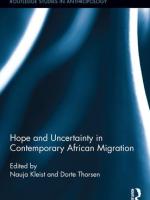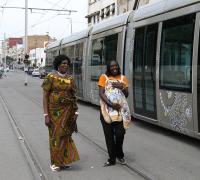How do deported migrants cope with life after deportation?
Deportation has become a widespread way for destination and transit migration countries to manage and deter irregular migrants, in Europe as well as in Africa. However, we rarely hear about what happens after deportation or about how deportees experience this situation.
In the new book chapter ‘Returning with nothing but an empty bag’, Nauja Kleist, senior researcher at DIIS, explores life after deportation among deported Ghanaian labour migrants, who have engaged in high-risk migration across the Sahara to Libya and in some cases across the Mediterranean to Europe. Based on longitudinal fieldwork, she shows that for most migrants and their families, deportation signifies the ultimate failure. Once they are deported, migrants can no longer send money back to their families - which was often the main goal of their migration in the first place. Returning empty-handed and relying on their families for survival, their social and economic conditions are often worse than before migrating. This situation not only creates severe economic problems for the migrants and their families; it is also extremely shameful. Therefore, Kleist argues, migrants consider returning empty-handed a personal and collective catastrophe to be avoided at almost all costs. Nevertheless, in situations of high youth unemployment and in the absence of available and attractive local livelihoods, high-risk migration continues to constitute a pathway of social hope for some deportees, despite the risks of crossing the Sahara and the Mediterranean and despite the risk of deportation.
The chapter is a part of the book ‘Hope and Uncertainty in Contemporary African Migration’, edited by Nauja Kleist, DIIS, and Dorte Thorsen, University of Sussex, and published by Routledge as part of the Studies in Anthropology series. The book is one of the outputs from a FKK-funded research program on the social effects of European and African migration management for West African migrants and for their changing horizons of hope.
DIIS Experts



